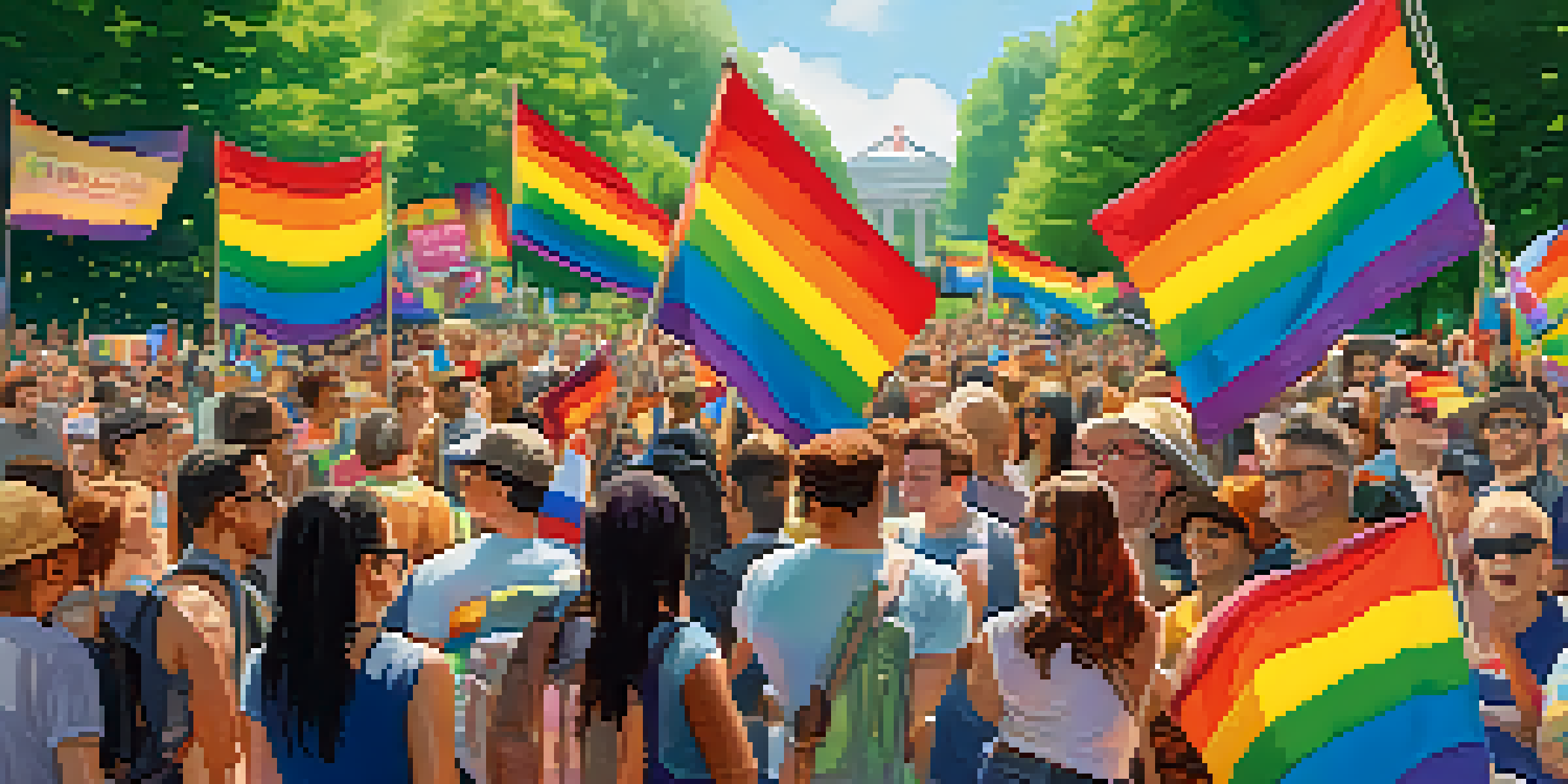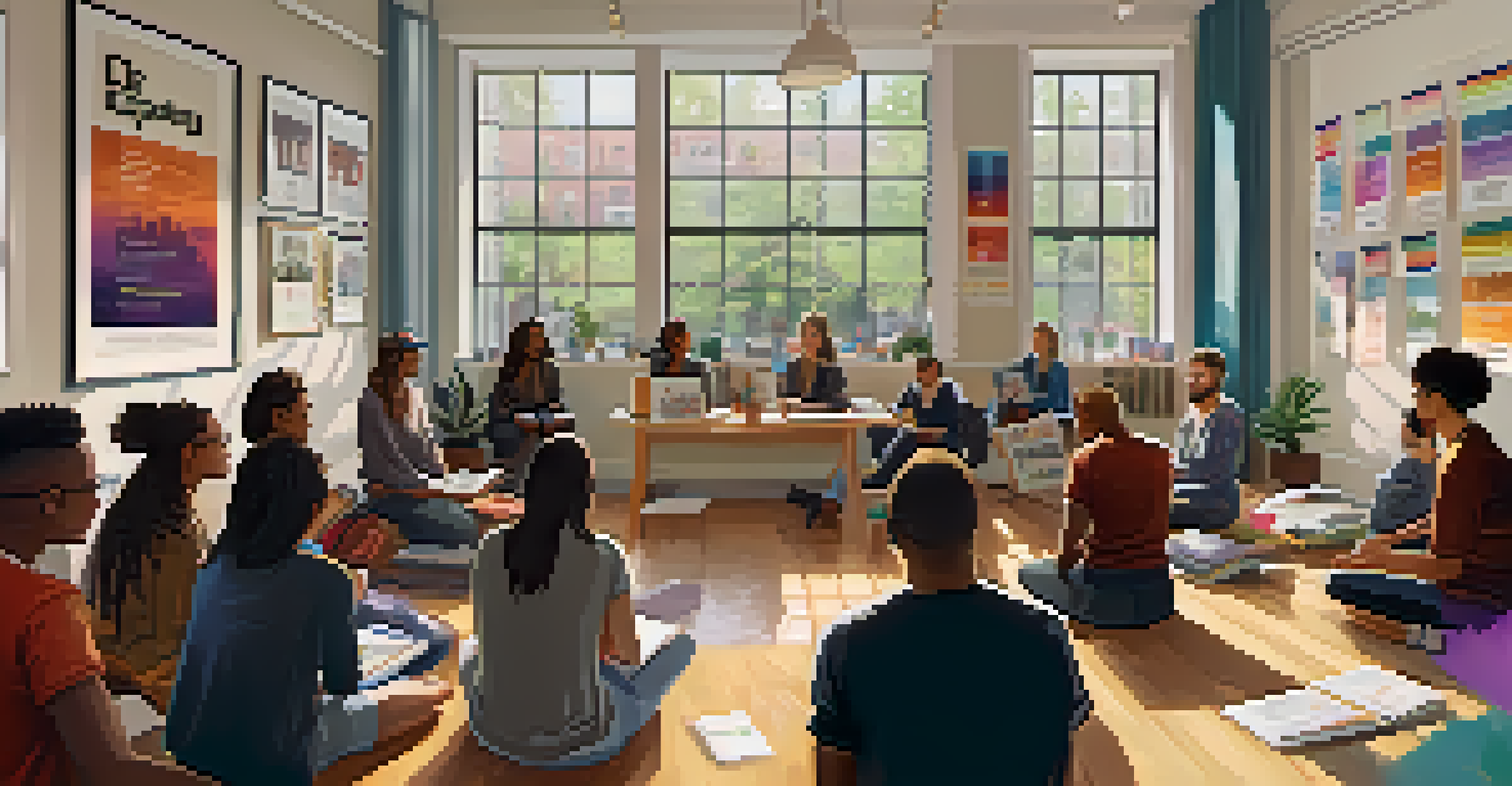Portland's LGBTQ+ Activism: Past Achievements and Future Goals

The Roots of LGBTQ+ Activism in Portland
Portland's LGBTQ+ activism has deep historical roots, dating back to the 1960s. The city's vibrant community has long been a sanctuary for those seeking acceptance and equality. Early gatherings and protests laid the groundwork for the rights we celebrate today, highlighting the resilience of local activists.
The fight for LGBTQ+ rights is far from over; we must continue to strive for a world where everyone is treated with dignity and respect.
Key moments, such as the Stonewall Riots in 1969, inspired many in Portland to mobilize for change. Activists began organizing events to raise awareness and advocate for LGBTQ+ rights. This grassroots movement not only united individuals but also built a strong support network that continues to thrive.
Today, we see the legacy of those early activists in the ongoing efforts to promote inclusivity and equality. This foundation has allowed Portland to become a beacon for LGBTQ+ individuals seeking support and community, showcasing the power of collective action.
Major Achievements in LGBTQ+ Rights
Over the years, Portland has celebrated significant milestones in LGBTQ+ rights. One of the most notable achievements was the legalization of same-sex marriage in Oregon in 2014. This victory was the result of tireless advocacy and mobilization by local activists, affirming love and commitment for all couples.

Additionally, the city's LGBTQ+ community has succeeded in establishing comprehensive non-discrimination policies. These laws protect individuals from discrimination based on sexual orientation and gender identity in various sectors, including employment and housing. Such legislative victories have greatly improved the lives of many.
LGBTQ+ Activism's Historic Roots
Portland's LGBTQ+ activism has a rich history that began in the 1960s, driven by early gatherings and protests advocating for acceptance and equality.
Furthermore, Portland's Pride celebrations have evolved into large-scale events, drawing in diverse audiences and fostering a sense of belonging. These celebrations serve not only as a reminder of past struggles but also as an affirmation of progress and solidarity within the community.
The Role of Local Organizations in Activism
Local organizations play a crucial role in Portland's LGBTQ+ activism landscape. Groups like Basic Rights Oregon and the Q Center provide resources, advocacy, and support to the community. Their efforts focus on education, outreach, and policy change, ensuring that LGBTQ+ voices are heard.
Our lives begin to end the day we become silent about things that matter.
These organizations often collaborate with local government and other non-profits to address pressing issues. For instance, initiatives aimed at combating homelessness among LGBTQ+ youth have gained traction through coordinated efforts. This teamwork amplifies the impact of their work, fostering a comprehensive approach to advocacy.
Moreover, these organizations often host events and workshops to educate the public about LGBTQ+ issues. By promoting awareness and understanding, they help bridge gaps and build connections within the broader community, reinforcing the importance of solidarity and support.
Intersectionality: A Focus on Diverse Identities
In recent years, Portland's LGBTQ+ activism has increasingly recognized the importance of intersectionality. This concept acknowledges that individuals may belong to multiple marginalized groups, affecting their experiences of discrimination and privilege. Activists are now emphasizing the need for inclusivity within the movement.
By prioritizing the voices of people of color, transgender individuals, and those from other underrepresented communities, Portland's activists aim to create a more equitable environment. This shift acknowledges that the fight for LGBTQ+ rights cannot be fully realized without addressing systemic inequalities.
Significant Achievements in Rights
The legalization of same-sex marriage in Oregon in 2014 and the establishment of comprehensive non-discrimination policies highlight Portland's progress in LGBTQ+ rights.
This approach not only enriches the movement but also fosters solidarity among various marginalized groups. It encourages collaboration and understanding, leading to a more unified front in the ongoing struggle for justice and equality.
Challenges Facing the LGBTQ+ Community Today
Despite significant achievements, Portland's LGBTQ+ community still faces challenges. Issues such as homelessness, mental health struggles, and discrimination remain prevalent, particularly among marginalized subgroups. Activists are continually working to address these pressing concerns through targeted initiatives.
Moreover, the rise of anti-LGBTQ+ legislation in various parts of the country has raised alarms within the Portland community. Activists are mobilizing to counteract these regressive movements, emphasizing the importance of vigilance and advocacy to protect hard-won rights.
Additionally, the COVID-19 pandemic has disproportionately affected the LGBTQ+ community, exacerbating existing inequalities. Activists are focusing on providing resources and support to those struggling, demonstrating resilience and adaptability in the face of adversity.
Youth Empowerment in LGBTQ+ Activism
Empowering youth is vital to the future of LGBTQ+ activism in Portland. Young activists are stepping up to champion their rights and those of their peers, bringing fresh perspectives and innovative ideas. Their involvement is crucial in shaping the direction of advocacy efforts moving forward.
Programs in local schools and community centers are fostering an environment of acceptance and understanding. By educating young people about LGBTQ+ issues and history, these initiatives help cultivate empathy and support among the next generation. This foundation is essential for nurturing future leaders in the movement.
Focus on Intersectionality
Recent efforts in Portland's LGBTQ+ activism emphasize intersectionality, recognizing the diverse identities and experiences of individuals within the community.
Moreover, youth-led organizations are emerging, giving a platform for young voices to be heard. These groups focus on pressing issues such as mental health, bullying, and social justice, ensuring that the concerns of young LGBTQ+ individuals are prioritized in ongoing activism.
Future Goals for LGBTQ+ Activism in Portland
Looking ahead, Portland's LGBTQ+ activists are setting ambitious goals to continue their fight for equality. A primary focus is on addressing the needs of the most vulnerable within the community, ensuring that resources and support are accessible to everyone. This commitment to inclusivity is vital for fostering a more equitable future.
Additionally, there is a strong push for increased representation in local government and decision-making processes. Activists recognize that having LGBTQ+ individuals in positions of power can lead to more informed policies that reflect the community's needs and concerns. This goal is crucial for sustaining progress.

Finally, building coalitions with other social justice movements is a key objective. By standing in solidarity with other marginalized groups, Portland's LGBTQ+ activists can amplify their efforts and create a more comprehensive approach to social change. This collaborative spirit is essential for achieving lasting impact and fostering a more inclusive society.